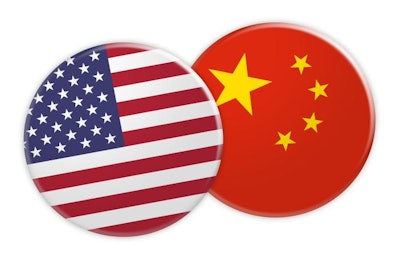
The U.S.-China trade war is ramping up again, as China says it will impose retaliatory tariffs on an additional $60 billion of U.S. goods if U.S. President Donald Trump makes good on his threat to impose duties on almost all Chinese imports.
China’s Ministry of Finance said its new tariffs on items, including meat products and wheat, will take effect September 24.
According to reports, a 10 percent tax on about $200 billion of Chinese imports will take effect on September 24 and will rise to 25 percent in January if China does not offer trade concessions.
This newest round of tariffs comes after the United States imposed a 25 percent tariff on $50 billion worth of Chinese exports in June.
US farmer groups speak out
According to the American Farm Bureau Federation (AFBF), in 2017, the U.S. exported more than $19.6 billion worth of agricultural products to China, making it the second-largest export market for U.S. farmers and ranchers. The Chinese market has increased exponentially for U.S. farm and ranch goods since 2000, becoming especially critical for U.S. soybean growers, who sent nearly 60 percent of their 2017 crop there.
“With plummeting Chinese demand for U.S. soybeans tagged with a 25 percent tariff, USDA in August projected the average soybean price would range from $7.65 to $10.15 per bushel, down from a month earlier, when the projected average price was $8.00 to $10.50 per bushel. In one month, the estimated price declined 3-to-4 percent,” AFBF said in a statement.
“These tariffs are going to be paid for by the working families who drive our economy,” said Tariffs Hurt the Heartland spokesman Jonathan Gold in a statement. “Tariffs are taxes, plain and simple. By choosing to unilaterally raise taxes on Americans, the cost of running a farm, factory or business will grow. In many cases, these costs will be passed on to American families. Tariffs have already resulted in layoffs, and this escalation will continue to squeeze American businesses with higher input costs and American farmers with decreasing commodity values.”

















